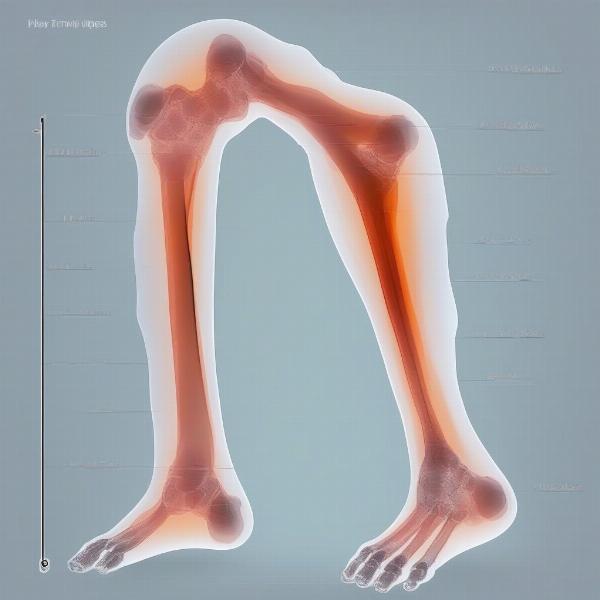Elevated alkaline phosphatase (ALP) levels in dogs can be a concerning finding on a blood test. While not a disease in itself, increased ALP often signals an underlying health issue that requires further investigation. This article will delve into the common causes of high ALP in dogs, the diagnostic process, and potential treatment options. Understanding what elevated ALP means can help you work with your veterinarian to ensure your canine companion receives the best possible care.
What is Alkaline Phosphatase (ALP) and Why Does it Matter?
Alkaline phosphatase (ALP) is an enzyme found in various tissues throughout a dog’s body, primarily in the liver and bone. It plays a vital role in several metabolic processes. When these tissues are damaged or undergo certain changes, ALP levels can rise in the bloodstream.
Common Causes of Elevated ALP in Dogs
A variety of conditions can contribute to elevated ALP in dogs. Some of the most frequent causes include:
- Cushing’s Disease (Hyperadrenocorticism): This hormonal disorder causes the adrenal glands to overproduce cortisol, leading to a range of symptoms, including increased ALP.
- Steroid Medication: Prolonged use of corticosteroids, like prednisone, can induce a significant increase in ALP levels. This is often referred to as steroid-induced ALP.
- Liver Disease: Conditions like hepatitis, cirrhosis, or liver tumors can damage liver cells, resulting in the release of ALP into the bloodstream.
- Bone Disease: Certain bone diseases, such as osteosarcoma (bone cancer) or hyperparathyroidism, can elevate ALP.
- Growing Puppies: Young, growing dogs naturally have higher ALP levels due to increased bone activity.
 Puppy Growth Plates X-ray
Puppy Growth Plates X-ray
Diagnosing the Cause of Elevated ALP
If your dog’s blood work reveals elevated ALP, your veterinarian will conduct a thorough examination and recommend further diagnostic testing to pinpoint the underlying cause. These tests may include:
- Blood Chemistry Panel: To assess other liver enzymes and kidney function.
- Urinalysis: To evaluate kidney health and detect other abnormalities.
- Bile Acid Test: To evaluate liver function.
- Imaging (X-rays, Ultrasound): To visualize the liver, bones, and other organs.
- Liver Biopsy: In some cases, a small tissue sample from the liver may be necessary for a definitive diagnosis.
Treatment Options for Elevated ALP
Treatment for elevated ALP depends entirely on the underlying cause. Addressing the primary condition is crucial to managing elevated ALP levels. For instance, treating Cushing’s disease or switching to a different medication may be necessary. In cases of liver disease, specific medications and dietary changes might be recommended.
What to Expect if Your Dog Has High ALP Levels
If your dog has high ALP levels, it’s essential to work closely with your veterinarian. They will develop a tailored diagnostic and treatment plan based on your dog’s individual needs. Regular monitoring and follow-up blood tests will likely be necessary to track progress and ensure the effectiveness of the treatment.
Conclusion
Elevated ALP levels in dogs are a sign that something might be amiss and warrant further investigation. By understanding the potential causes and working with your veterinarian, you can help your furry friend receive the appropriate care and improve their overall health. Don’t hesitate to discuss any concerns you have about your dog’s ALP levels with your veterinarian.
FAQ
- What are normal ALP levels in dogs? Normal ALP levels can vary depending on the laboratory and the dog’s age, but generally fall within a specific range. Your veterinarian can interpret your dog’s results.
- Is elevated ALP always a serious problem? Not necessarily. Puppies and dogs on certain medications can have elevated ALP without serious underlying disease.
- Can diet affect ALP levels? Yes, certain dietary factors can influence liver health and ALP levels. Your vet can recommend appropriate dietary changes if necessary.
- How often should ALP levels be monitored? The frequency of monitoring depends on the underlying cause and the treatment plan. Your vet will advise on the appropriate schedule.
- Are there any home remedies for elevated ALP? No, there are no proven home remedies for elevated ALP. It’s essential to consult with your veterinarian for proper diagnosis and treatment.
- Can stress affect ALP levels in dogs? While stress can influence some blood parameters, it’s not a common cause of significantly elevated ALP.
- What is the prognosis for dogs with elevated ALP? The prognosis depends entirely on the underlying cause. Early diagnosis and appropriate treatment are essential for the best outcome.
ILM Dog: Your Trusted Source for Dog Care Information
ILM Dog (https://ilmdog.com) is a leading online resource for dog owners worldwide, providing expert advice on all aspects of dog care, from breed selection and puppy care to senior dog health and training. We offer practical tips and insights to help you provide the best possible care for your furry friend. Our expertise encompasses various areas, including health and medical care, nutrition, behavior, and product recommendations. For personalized guidance and support, contact our team of experts at [email protected] or call us at +44 20-3965-8624.